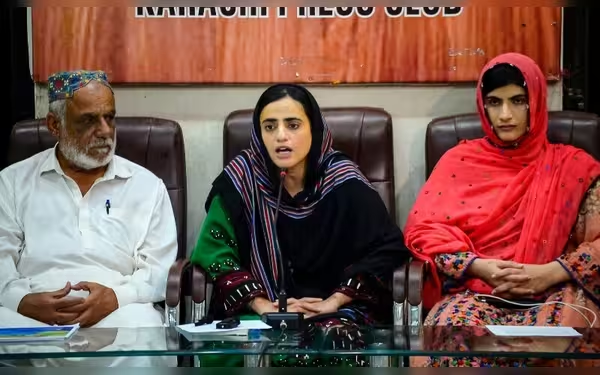Saturday, November 16, 2024 08:49 PM
Dr. Mahrang Baloch Faces Terrorism Charges After Travel Ban
- Dr. Mahrang Baloch booked in terrorism case.
- Barred from flying to New York for Time event.
- Accusations linked to activism for Baloch rights.
 Image Credits: dawn
Image Credits: dawnBaloch rights activist Dr. Mahrang Baloch faces terrorism charges after being barred from traveling abroad.
In a significant development, Baloch rights activist Dr. Mahrang Baloch has been booked in a terrorism case just days after she was barred from flying abroad. This incident has raised concerns about the treatment of activists in Pakistan, particularly those advocating for the rights of the Baloch people. Dr. Mahrang, a prominent leader of the Baloch Yakjehti Committee (BYC), has been vocal about issues such as enforced disappearances in Balochistan, making her a target for authorities.
On Tuesday, immigration officials at Karachi’s Jinnah International Airport prevented Dr. Mahrang from boarding a flight to New York, where she was set to attend a prestigious event hosted by Time magazine. She was invited to the gala due to her inclusion in the Time100Next list, which recognizes influential individuals. Dr. Mahrang claimed that the Federal Investigation Agency (FIA) was responsible for stopping her, and she expressed her intention to challenge this decision in court.
The situation escalated when a First Information Report (FIR) was filed against her by a local resident, Asad Ali Shams, who accused her of inciting violence and making allegations against security institutions. The FIR, registered by the Quaidabad police, invoked several sections of the Anti-Terrorism Act and the Pakistan Penal Code, including charges related to sedition and promoting enmity between groups.
Despite the serious nature of the allegations, the local police officer, Farasat Shah, stated that Dr. Mahrang and her colleagues had not engaged in any protests on the day the complaint was made. The complainant's claims suggest a personal grievance against Dr. Mahrang, as he accused her of instigating people against the state. The FIR also alleged her involvement with various militant groups, including the Baloch Liberation Army (BLA).
In response to these developments, Dr. Mahrang has labeled the case as "fabricated" and indicative of the state's discomfort with her activism. She emphasized that her peaceful efforts would not be hindered by what she described as illegal and unconstitutional tactics. In her view, these actions are part of a broader campaign to intimidate her and distract from the failures of security agencies in maintaining law and order.
Dr. Mahrang's determination to fight back against these allegations is evident. She has vowed to pursue justice through legal channels, asserting that the FIR aims to threaten the collective struggle of the Baloch nation. Her commitment to activism remains strong, as she continues to advocate for the rights of her people.
This incident highlights the ongoing challenges faced by activists in Pakistan, particularly those who speak out against state policies. The implications of such actions extend beyond individual cases, raising questions about freedom of expression and the treatment of dissent in the country. As the situation unfolds, it remains crucial for the public and international community to pay attention to the plight of activists like Dr. Mahrang Baloch, who are fighting for justice and human rights in a complex and often hostile environment.













